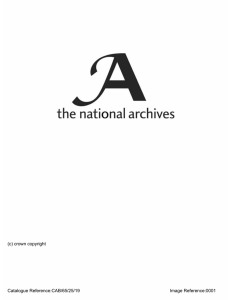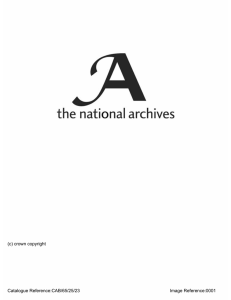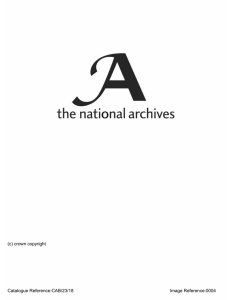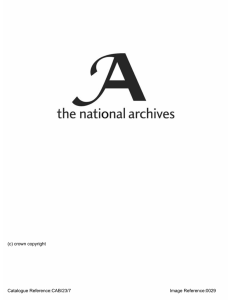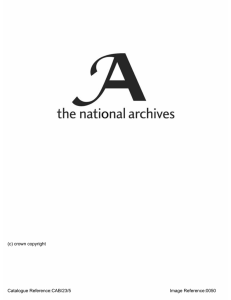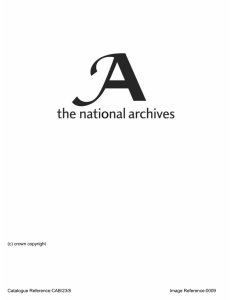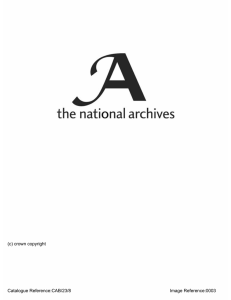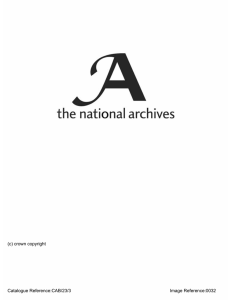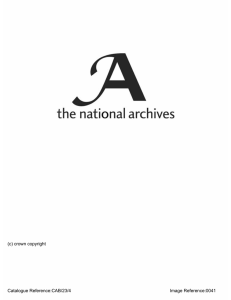(c) crown copyright Catalogue Reference:CAB/23/3 Image Reference:0036
advertisement
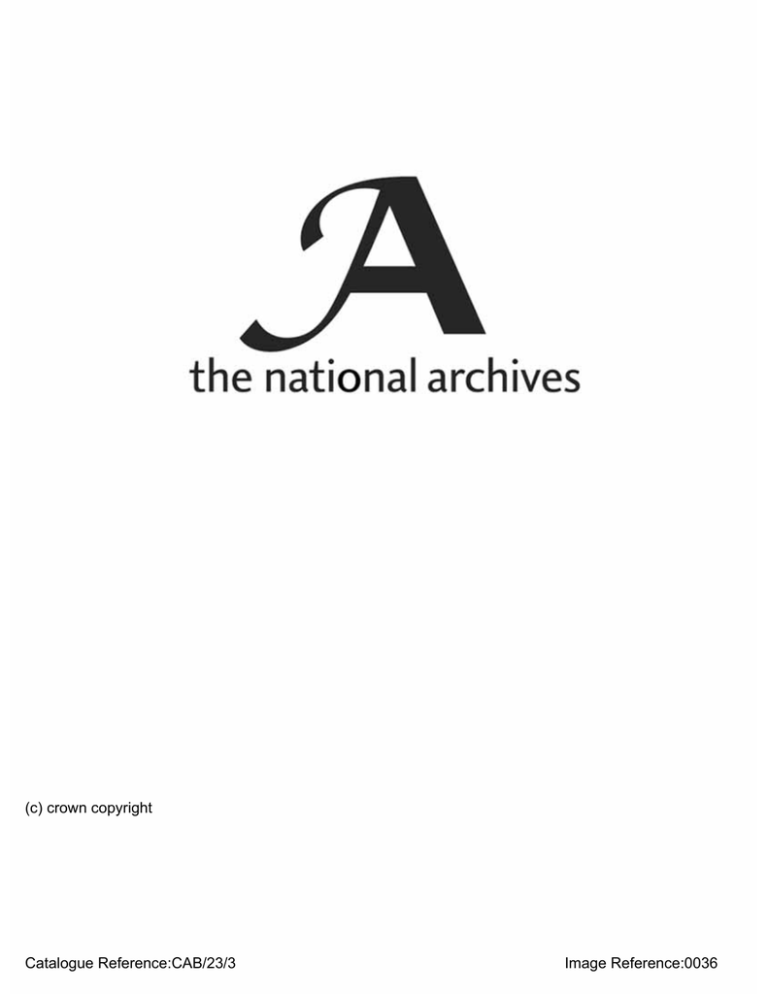
(c) crown copyright Catalogue Reference:CAB/23/3 Image Reference:0036 £^JL^££^i^BLl^^^? P r o e r t y o f H i Britannic Majesty's Government.] s Printed for the War Cabinet. July 1917. SECRET. 83 WAR CABINET, 1 8 8 . Minutes of a Meeting of the War Cabinet, held at 10, Downing Street, S.W., on Tuesday, July 17, 1917, at 11*30 A.M. Present: (in the Chair). T H E P R I M E MINISTER The Right Hon. the E A R L KEDLESTON, K G , G . C . S . I . , The Right Hon. CTJRZON OF G.C.I.E. VISCOUNT MILNER, G . C . B . , G.C.M.G. The Right Hon. T H E R I G H T R O N G. N . ^ BARNES, M.P. ^ K P Lieutenant-General the Right Hon. J . C. SMUTS, K . C . The following were also present : The Right Hon. the E A R L of DERBY, K G . , G.C.V.O., C.B., Secretary of State for War. General S I R W. R. ROBERTSON, G.C.B., K C . V . G , D.S.O., Chief of the Imperial General Staff. The Right Hon. S I R E . CARSON, K G , First Lord of the Admiralty. M.P., Admiral S I R J . R. JELLICOE, G.C.B., CM., G.C.V.O., First Sea Lord and Chief of the Naval Staff. Lieutenant-Colonel S I R M. P. A. H A N K E Y , K G B . , Secretary. Mr. THOMAS JONES, Assistant Secretary. Captain the Hon. W. ORMSBY-GORE, M.P., Assistant Secretary. The Eastern Front. 1. T H E Chief of the Imperial General Staff reported that the number of prisoners taken by the Russians since the offensive began had now been ascertained to exceed 36,000 ; the number of guns taken was 93. Heavy Guns for ' 2. With reference to War Cabinet 176, Minute 10, the Chief of the Imperial General Staff drew attention to a telegram received from General Foch regarding the heavy artillery to be given to the Italians to enable them to resume the offensive. General Foch was sending six batteries and a few odd howitzers, thirty-four pieces in all. The Chief of the Imperial General Staff stated that he could spare six batteries of 6-inch howitzers almost a t once. The War Cabinet decided that— a y These six batteries should be sent. [1365-188] Mr. Arthur Henderson's Return from Russia. 3. The Secretary read a telegram he had received from Mr. G. M. Young in regard to Mr. Arthur Henderson's return, in which it was suggested that the Admiralty should send a cruiser to Bergen. The First Sea Lord pointed out that if a cruiser were sent it would he necessary to attach two destroyers as an escort, whiah. would be at the expense of the limited and insufficient number of destroyers available for general Naval duties and merchant-ship protection. The War Cabinet decided that— Mr. Henderson should be asked to make use of the ordinary boat from Bergen, and instructed the Secretary to ask the Foreign Office to communicate with Mr. LTenderson accordingly. Auxiliary Steamer " Eedbreast." 4. The First Sea Lord reported that on the 15th instant the auxiliary steamer " Redbreast " had been torpedoed and sunk in the Mediterranean, with a loss of four officers and forty men. Seaplane Attack on Adana. 5. The First Sea Lord stated that on the 15th instant the cotton factories at Adana were successfully attacked by four seaplanes. Movements of German Merchant Ships. 6. The First Sea Lord reported that four German merchant ships that had sailed from Rotterdam had been captured and two more driven ashore by a British force under Commodore (T). On the voyage to England the destroyers escorting the prizes were attacked by submarine, but the torpedoes missed. The Forthcoming Conferences in Paris. 7. The First Sea Lord stated that he had received an invitation to be present at a Naval Conference in Paris, which was to be attended by the Italian Naval Commander-in-Chief, and was to take place on the same date as the Inter-Ally Conference. The War Cabinet authorised him to accept the invitation, but noted that his presence would also, in all probability, be reqiured at the Inter-Ally Conference. Mr. Eamsay Macdonald. 8. With reference to War Cabinet, 176, Minute 1, Mr. Barnes expressed the opinion that this matter should now be dropped. Pie had seen Mr. Havelock Wilson, of the Seamen's and Firemen's Union, who informed him that he had done his best to get the embargo removed, but the mates and the men absolutely declined. It was pointed out that there were grave difficulties in prose­ cuting the Seamen's and Firemen's Union, even if the Government desired to do so. It was generally agreed that public opinion would not support the Government if they tried to force the seamen and firemen to take Mr. Ramsay Macdonald. The War Cabinet decided that— The matter should now be dropped and no further action taken. Ireland: Application of the Redistribution Proposals of the Representation of the People Bill. 1 9. The War Cabinet considered the representation submitted to the Prime Minister by Sir John Lonsdale, Bart., M.P. (Paper G.T.­ 1350), and it was decided that— A Committee, composed of— Exchequer (Chairman), Sir Edward Carson, Sir George Cave, Mr. Duke, Dr. Addison, Mr. H. A. L. Fisher, With Prof. Adams as Secretary, T h e c t a n c e ] l o r o f t h e should enquire into the matter and report as soon as possible. The Committee were, if possible, to ascertain the views of the Irish Nationalist party. Channel Tunnel. 10. The Prime Minister brought forward a letter he had received regarding the Channel Tunnel, and it was decided— To refer the question to the naval and military authorities and the Board of Trade for their opinions before an answer could be discussed. The Secretary was instructed to give effect to this decision. Pood Prices and Pood Distribution. 11- In reference to the question of the limitation of food prices by State action, the War Cabinet had before them memoranda bv the Ministry of Food (Papers G.T.-14J9, 1419 A, and 1419 B); a memorandum by the President of the Board of Agriculture and Fisheries (Paper G.T.-1351); and a memorandum by the Secretary for Scotland (Paper G.T.-1412). It was pointed out that the eight Labour Commissions had reported independently that one of the main causes of the present industrial unrest was the high prices of food. With reference to Lord Rhondda's proposal that the purchase of War Office food supplies should be transferred to the Food Controller (Paper G.T.-I419), Lord Derby intimated that the Quartermaster-General and other War Office authorities had not yet had time to examine the whole question of army purchases of food, but would be in a position to report on the following clay. It was decided that— Lord Milner should meet the Food Controller, the President of the Board of Agriculture and Fisheries, and representatives of other Departments concerned, the same afternoon;" that he should meet the War Office authorities on the following­ afternoon, and that he should bring forward the results at a meeting of the War Cabinet on Thursday or Fridaj next. r Parliamentary Arrangements. 1 2 . As the result of a discussion on the question of the Parliamentary programme, the War Cabinet decided that— (a.) That the Corn Production Bill being of the most immediate urgency and its passing being essential to the success of the Agricultural Programme, should be passed into law before the adjournment of Parliament. (b.) The House of Commons should therefore be asked to devote as much time as possible to this Bill, as well as to agree to the application of the closure and the suspension of the 11 o'clock rule for the remainder of the Session, (c.) Parliament should be asked to resume the discussion of the Representation of the People Bill while the Corn Production BiU is under consideration in the House of Lords. , 2, Whitehall Gardens, July 17, 1917. S.W., o T^^r^.^—-— r—


